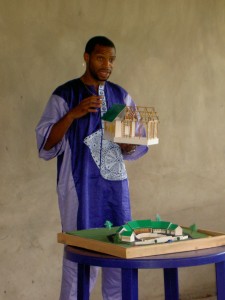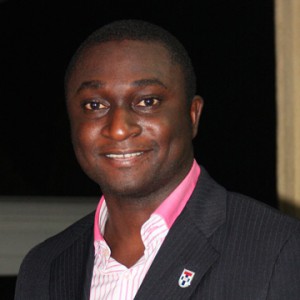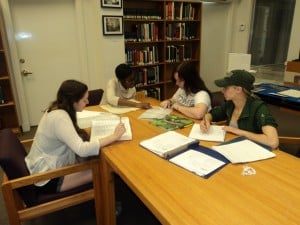 Being a Fulbrighter has helped me to fulfill a lifelong career goal: I have always wanted to design an artistic building made from sustainable materials which would effectively address social issues like community education. On a personal level, being a Fulbrighter has also profoundly enhanced my knowledge of Yoruba culture. Because I have a better understanding of exactly for whom and where I am designing, I am now able and determined to create practical proposals. Because I was pushed to learn Yoruba, I am also much more adaptable to change.
Being a Fulbrighter has helped me to fulfill a lifelong career goal: I have always wanted to design an artistic building made from sustainable materials which would effectively address social issues like community education. On a personal level, being a Fulbrighter has also profoundly enhanced my knowledge of Yoruba culture. Because I have a better understanding of exactly for whom and where I am designing, I am now able and determined to create practical proposals. Because I was pushed to learn Yoruba, I am also much more adaptable to change.
My Fulbright experience marked the first time I took learning another language seriously. Learning Yoruba helped me to gain career experience because it allowed me to manage a construction site by interacting closely with workers. By speaking Yoruba on a site, I changed people’s perceptions about Americans and helped to facilitate my acceptance into the local community. I tried my best to assimilate as much as possible. I prostrated to greet elders, fetched my own water, ate the same foods as locals and took public transportation instead of using a private driver.
What you choose to study on your Fulbright makes a big difference in terms of gaining acceptance within your local host community. Researching sustainable architecture provided me with an excellent opportunity to engage a wide range of people. From the families in Igbogun, to architecture students at Olabisi Onabanjo University, my project helped me to connect with everyone I met. Building a school in Ibogun also allowed me to leave a lasting impression on my host community by investing in their children’s education.
An added benefit to building a school in Igbogun is that it will serve as a case study for designs I will create using brick and bamboo to address affordable housing in Lagos. It’s a tangible example of sustainable architecture techniques that protect the environment, save money and create beautiful spaces that will connect people. This career path feels natural to me, and I am happy that it has facilitated my growth as a leader in my communities both in the United States and in Nigeria by providing something useful for children.
I started my Ph.D. at the University of Lagos (Unilag) during my Fulbright grant and I plan to return to Nigeria next year to continue pursuing my research until the primary school is complete. Designing, fund-raising and building a project from start to finish is a rare opportunity that few recent architecture graduates are able to experience. Currently, the library structure is up to the roofing level. When I return, I will build classroom spaces using bamboo. The work I accomplished as a Fulbrighter literally laid the foundation for what I plan to do next.
Here are my tips for study/research applicants:
- Research something practical that can affect people’s lives after you leave your host country. Find a creative but professional approach on how to achieve it. Is your research project about an interesting topic that only academics can discuss, or is it something that you can share with your local host community and use to engage it? The benefit of the latter is that your host community will connect with your research immediately and will therefore appreciate both you and your work that much more. Also, ask yourself: what impact will my research have on the larger society within my host country? Can it be replicated? These are considerations that will help support a good project.
- Describe why you are the only person who can make your project happen. Write about your personal and academic history and why they fit nicely into your proposed Fulbright project and life’s work. Talk about your proposed local host connections and how they will help you to accomplish your research. Also, focus on how you and those you’ll interact with will both benefit from your project.
- Learn another language so that you can discuss your research project with those with whom you’ll interact in your host country. Some countries in the Fulbright U.S. Student Program have language requirements, so check the Fulbright Country Summaries carefully first. Speaking the local language is a great way to make new connections and will allow more people to give you feedback and ask questions. And, by speaking regularly, you will become more motivated to improve your language skills as well as the research you’re conducting. Be open about this. Resist the temptation to stay in your comfort zone. Loosen up and experience another way of life.
To see architectural drawings and renderings of my Fulbright project, click here.
To see construction photos of my Fulbright project click here and here.
Photo: Samuel Babatunde Ero-Phillips, 2010-2011, Nigeria, addressing the council of chiefs’ meeting in the village of Igbogun on Saturday, November 20, 2010, about his intention to build a primary school. The model on the table shows the primary school in its completion. A library made from adobe brick occupies the middle. Adjacent to this structure on both sides are classroom spaces made from bamboo. The larger model in his hand shows enlarged detail of the bamboo building construction.



